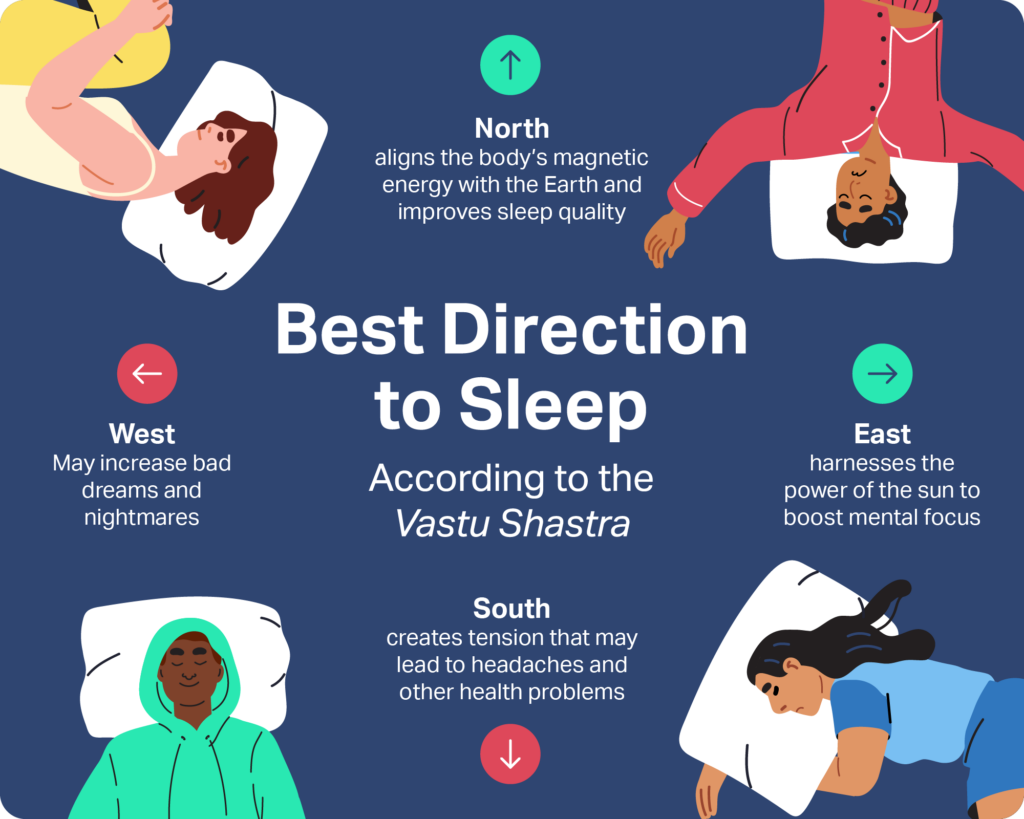Introdution
In the pursuit of a good night’s sleep, the direction in which you lay your head holds more significance than you might think. Your sleeping position can impact various aspects of your health and well-being, from alleviating snoring to reducing back pain. Let’s explore the best direction to sleep for optimal rest and rejuvenation.
East or West: Which Way is Best?
Finding the ideal orientation for your sleep might seem like a trivial matter, but it can make a significant difference in how you feel the next morning. Sleeping with your head towards the east or west has long been debated for its potential benefits, rooted in ancient practices and modern scientific theories alike.
Head Towards the East for a Refreshing Morning
Positioning your head towards the east while sleeping is often recommended in traditional practices like Feng Shui. Proponents believe that this alignment harnesses the positive energies of the rising sun, promoting a sense of renewal and vitality upon waking up.
Moreover, scientific studies suggest that sleeping with your head towards the east might synchronize your body’s internal clock with the natural rhythms of daylight, potentially leading to a more restful and refreshing sleep cycle.
The Comfort of the South: A Southern Perspective
Contrary to the eastward preference, some individuals find solace in sleeping with their heads towards the south. This inclination stems from cultural beliefs and anecdotal evidence suggesting enhanced relaxation and tranquility when aligned with the Earth’s magnetic field.
Embrace the Southern Direction for Serene Slumber
Sleeping in a southward orientation is often associated with deep relaxation and improved sleep quality. Advocates of this position claim that it fosters a deeper connection with nature’s magnetic forces, promoting a sense of harmony and balance throughout the night.
While scientific evidence supporting these claims remains limited, many individuals attest to feeling more rested and rejuvenated after adopting this directional preference.
Navigating the North: Exploring Alternative Orientations
While the east, west, and south directions dominate discussions on optimal sleep positions, the north also warrants consideration for its potential impacts on sleep quality. Although less commonly practiced, sleeping with your head towards the north carries its own set of beliefs and purported benefits.
Venturing North: A Unique Approach to Sleep
Sleeping with your head towards the north is a practice deeply ingrained in certain cultures and belief systems. Some traditions associate this orientation with spiritual alignment, claiming that it enhances dream recall and promotes a deeper connection to the subconscious mind.
While scientific evidence supporting these assertions remains scant, individuals who have adopted this directional preference often report experiencing vivid dreams and a heightened sense of introspection during sleep.
FAQs
Q: Does the direction I sleep in affect my dreams?
A: While there’s no definitive scientific evidence, many people believe that sleeping orientation can influence the content and clarity of their dreams. Experimenting with different directions may offer insights into your dream experiences.
Q: Can sleeping direction alleviate snoring?
A: Sleeping with your head elevated or in a specific direction may help reduce snoring by promoting better airflow and alignment of the airways. However, individual results may vary, and consulting a healthcare professional is advisable for persistent snoring issues.
Q: How do I determine the best direction to sleep for myself?
A: Finding the optimal sleep direction is a personal journey. Experiment with different orientations and observe how each affects your sleep quality, comfort, and overall well-being. Listen to your body’s cues and adjust accordingly.
Q: Is there a scientific basis for choosing a sleep direction?
A: While some cultural practices and anecdotal evidence support specific sleep orientations, scientific research on this topic is limited. Factors such as personal comfort, mattress quality, and sleep hygiene habits may have a more significant impact on sleep quality.
Q: Can changing my sleep direction improve my sleep quality?
A: For some individuals, experimenting with different sleep orientations may lead to improvements in sleep quality, comfort, and overall well-being. However, it’s essential to consider various factors, including personal preferences and underlying sleep disorders.
Q: Are there any risks associated with changing sleep directions?
A: In general, changing your sleep orientation is unlikely to pose significant risks to your health. However, individuals with certain medical conditions or chronic pain may benefit from consulting a healthcare professional before making any adjustments.
In Conclusion: Rest Easy with the Right Direction
While the debate over the best direction to sleep continues, one thing remains clear: the position in which you lay your head can influence your sleep quality and overall well-being. Whether you prefer the rejuvenating embrace of the east, the tranquil serenity of the south, or the introspective depths of the north, finding your ideal sleep direction is a personal journey of exploration and self-discovery.
Remember to listen to your body’s cues, prioritize comfort, and create a sleep environment conducive to relaxation and rejuvenation. By paying attention to the subtle nuances of your sleep orientation, you can unlock the secret to a truly restful and revitalizing night’s sleep.




